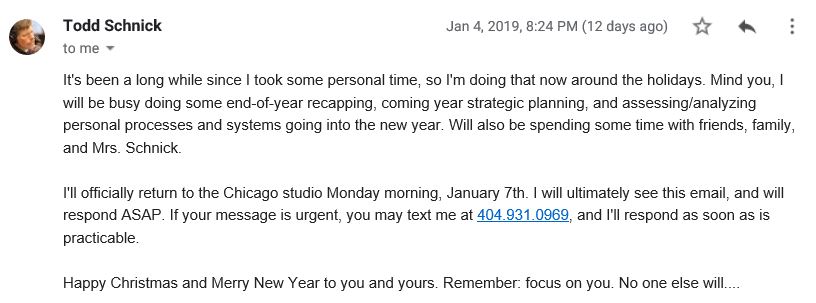Perhaps the title may have been a little harsh. No, I stand by it.
I have to admit I have been feeling this way for a while. Years, even. We leave the office for whatever reason (insert 1,001 human situations here) and so we found it to be helpful to others if we alerted them to the fact that we aren’t simply ignoring them but in fact we are not in our email right now. However, somewhere in our “bigger/better/faster” societal mentality we mutated that general courtesy to become a tool to communicate with others just how committed we are to our work. It is another glorification platform for being workaholics, drivers, and the holy grail: busy.
Here is a common version of an out-of-office message:
“I am currently out of the office with limited access to email or voicemail. I will return to the office on Wednesday December 10th and will respond to your email upon my return.”
Let’s break this down. Unless you are traveling to the outback, you probably have access to your voicemail and email, you are choosing not to review them during your time away. We live in a digital age, let’s own up to that. I think it is also safe to assume that you will read your email upon return, so you probably could leave that out.
Our seemingly innocuous message and subsequent behavior sends communication to those around us about what our boundaries and priorities really are. If you put an out-of-office message up that you aren’t available, yet respond to all of the emails you receive before your listed return date, you are training your correspondence partners that they should ignore your message and instead rely on your actions. If your out-of-office message says something to the tune of “I barely stepped away for three seconds for my once-a-week bathroom break, please don’t quit me if I don’t respond immediately,” you are signaling to people that you are always tied to your email. And in response, what do people do? They email you more.
Your out-of-office message is an opportunity to communicate your priorities to others, to match your actions to your words and to set boundaries.
Your out-of-office message is an opportunity to communicate your priorities to others, to match your actions to your words and to set boundaries. It is okay to take your vacation time and communicate that to people accordingly. If you say you aren’t responding to emails, I encourage you to stay true to that intention. Boundaries are simply you communicating with others what you are going to do. Think how valuable it could be for you to tell people how to interact with you, and then they do it. More often than not we become frustrated with how people are using OUR time or energy when it is because we signaled to them that it was okay to steal it from us.
Sometimes we are working our asses off, and we still put an out-of-office message up when really we are just so busy it is an “out-of-email” message. We have to tell people “I am so busy I literally can’t check my email as fast as you want a response.” Consider this: what is your standard, acceptable turnaround time for answering emails in your organization; 24 hours on business days? Then perhaps resist putting up an out of office just because you will be in a half-day training. This communicates to those around you that it is perfectly acceptable for you to answer an email that is 23-hours ripe.
Thankfully, not everyone subscribes to the madness, and you don’t have to either. In a move of organizational badassery, one boss and mentor of mine had once put up a message that stated that if the email was important, the sender should send it after his return date. He promptly deleted every email he received on vacation upon his return without reading them. Only a few emails were re-sent after his return, and the only thing he missed was losing a day of his life reading through old, useless emails.
As I was writing this article, I received a (totally unprompted) glorious out-of-office message. Here it is:

The next time you have to write an out-of-office message, try this one on for aspiration:
“Thank you for your message! I am making a priority in 2019 to (a) take all of my vacation and rest time, and (b) be more present with my family outside of work. I will be vacationing in Florida with my kids, and I can’t wait to see their faces when we show up at Disney. I imagine there is internet in Florida, but I won’t be reviewing my email until I am back on Monday, February 9, fully refreshed and full of sun. Wish me luck at the princess breakfast!”
And no way should you email anyone before the stated date. Now people will respect your time off, learn more about who you are, and have a good icebreaker to ask you about your trip.
Whew, thanks for letting me get all that out. I feel much better.
About the author:
Katie Rasoul is the Chief Awesome Officer for Team Awesome, a leadership coaching and culture consulting firm. Find out more by visiting www.teamawesomecoaching.com or join the Team Awesome Community for awesomeness coming straight to your inbox. Follow Team Awesome on Instagram, Facebook and Twitter.



Love this! The trend I’m also seeing that if people are working all day in meetings they put that on their out of office. Craziness. Me working doesn’t mean I’m out of the office. I’m sure it comes from our expectation for immediate response.
Oh and one more thing…..don’t event get me started on the double signature. If you have an automatic signature on your email you don’t need to restate your name. I get it. I know who you are.
HA HA HA
Once we examine it, we do some pretty silly things at work, but they have real consequences. Someone may feel their whole vacation was ruined because of email, when they never set the boundary in the first place. Or in meetings, ohhh, the meetings.
Oooh, I’ve got some PTO coming up in March and could basically lift your example. I’ll be giving that OOO message a revamp before we go wheels up!
Yaaasss! Please steal and use away. Enjoy (I mean really enjoy) your time away!